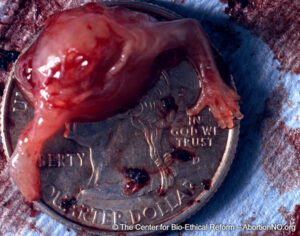“It brings me no joy to sue one of our own cities,” Delaware’s attorney general said when she took legal action today against the city council of Seaford, a town of fewer than 8,000 people, for enacting an ordinance that requires “anyone who has an abortion or experiences a miscarriage to pay for the fetus to be interred or cremated.”
Read story here; read up on Seaford here.
This is harassment of abortion providers and patients, pure and simple. The obvious intent is to discourage abortions by burdening them with additional costs. This is especially discriminatory against poor women. Passing the ordinance apparently was motivated by Planned Parenthood’s plans to open an abortion clinic in the county where Seaford is located.
Whether you support or oppose abortion is beside the point. Under current Supreme Court jurisprudence, abortion is a constitutional right. Seaford’s town council has no right to burden it with a financial penalty. That’s like taxing the exercise of free speech.
The state’s legal argument, however, is more mundane. The state contends that state law regulates disposal of human remains, and also specifies when fetal tissue falls within the definition of human remains, which the state attorney general argues “leaves no room for further policy on the matter.” In other words, the town’s ordinance collides with state law, and state law prevails.
The right-to-life movement argues that human life begins at conception. That’s a philosophical position, not a conclusion grounded in science or medicine. In the original Roe v. Wade decision, the Supreme Court struggled with the question of when human life begins, and settled on birth. However, in subsequent decisions, it allowed greater regulation of abortion at later stages of pregnancy. All of these decisions are legal expediencies. No one can draw a bright line between “fetus” and “baby,” because there isn’t one. Any attempt to make that distinction is destined to be arbitrary.
My political “birth,” so to speak, happened in my teens. That’s when I became interested in politics. Back then, I was a Goldwater conservative. One of the chief attractions of conservative ideology to me was simplicity: Conservatives often saw the world in black-and-white terms. That made taking sides on issues, and answering complicated public policy questions, much easier.
As I grew older, and gained more life experience, I came to realize we weren’t gifted a simple world, where things are black-and-white, by the Creator. We are saddled with living in a world full of imperfections, moral ambiguities, and gray zones; and we have to navigate it as best we can.
Seeing abortion in black-and-white moral terms is too simplistic. Interfering with someone else’s decision to get an abortion can inflict serious harm on that person and also the child in some cases. Abortion supporters also call out the hypocrisy of opponents who turn their backs on children’s needs after they’re born. Liberals also often argue that conservatives’ regard for human life stops at birth, citing their warmongering, support for the death penalty, and obstruction of efforts to rein in gun violence.
Some people think they have all the answers. Generally, they don’t. When abortion is a legal right, the decision is left to the woman. Making abortion illegal takes away her freedom to make moral and practical choices. Then it becomes self-righteous people telling others how to live, regardless of the consequences they impose on others. They may think they’re acting morally by doing that; but that, too, at best is morally ambiguous.
 As for me, I don’t think the aborted fetus in the photo is a “person.” It’s a blob of tissue. It has no thought, feeling, or awareness that it exists. I doubt Seaford’s town fathers care what happens to it any more than they are about their own fingernail clippings. Insisting on holding a funeral for it is just a pretext for attacking the legal right to an abortion. The proper place to do that is in the Supreme Court, not Seaford’s town council chambers.
As for me, I don’t think the aborted fetus in the photo is a “person.” It’s a blob of tissue. It has no thought, feeling, or awareness that it exists. I doubt Seaford’s town fathers care what happens to it any more than they are about their own fingernail clippings. Insisting on holding a funeral for it is just a pretext for attacking the legal right to an abortion. The proper place to do that is in the Supreme Court, not Seaford’s town council chambers.